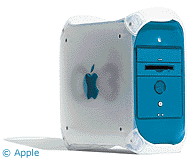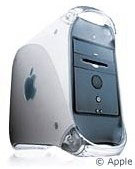About five years ago I wrote two articles on picking an older
Power Mac (see Picking an Older Power
Mac, 2000.04.06, and Picking a
PCI Power Mac, 2000.09.15). The Power Mac G4 had been updated
for the first time in July 2000 and was available in three speeds:
400, 450, and 500 MHz.
Blue & white Power Macs
G3s were still pretty modern and were going for US$1,000 or
more. Beige G3s were still
commanding at least US$500, and the 604e-based PowerMacs were in
the US$400+ range as well.
That Was Then
So what was at the low end?
The next step down from the 604-based models (and I'm including
the 7500 because it was essentially the same as the 7300 and 7600
except for the processor card) was the 603e-based Performas. These
machines still were selling for over $250, and for the most part
they could run then-current software.
The even-lower-end sub-$250 range was made up of the PowerPC 601
PowerMacs, the 6100, 7100, and 8100. My first article for Low End Mac argued
that these machines were still perfectly viable for basic computing
tasks - email, Internet, and basic "Office" type applications (MS
Office, AppleWorks, etc.).
Along came MP3s and other digital music formats, high-quality
video, and extensive Flash animated websites. Digital photography
became popular, portable MP3 players (like the iPod) started
appearing, and all of a sudden the question wasn't "Can I go online
with it?", but "Can I upload and edit movies and photos? Can I make
CDs and DVDs?"
A 6100 would struggle. Yes,
with an external CD-RW drive you could burn CDs, but these ancient
Power Macs have trouble playing MP3 files - and forget about AAC or
WMA, which require much more processing power. While a 6100 is
still great for word processing, spreadsheets, email, and simple
Web browsing, don't expect to go to PureVolume and check out
some new bands with it.
This Is Now
The low-end today was the high-end in 2000. The big cutoff in
2000 was the 680x0/PowerPC divide. If it didn't have a PowerPC
chip, prices were considerably lower because the software being
released in 2000 just couldn't run on it. Starting with the release
of Mac OS 8.5 in 1998, non-PowerPC Macs could no longer run the
current version of the Mac OS.
Some would say that the big cutoff today is the G3. If it
doesn't have a G3, OS X can't run on it (unless you want to
use
XPostFacto and run 10.1.x unsupported - and very slowly
- on a 604e chip).
Unfortunately, the beige G3s acts like somewhat unsupported
machines. The reliability of OS X on them is a bit sporadic
(some work fine, others don't), and the serial ports and floppy
drive don't work. Other than that, the processors they shipped with
are quite slow (although they can be upgraded), and even though
OS X will run on them, a lot of other applications won't.
New World ROMs
I believe the real cutoff is the "Old World" machines. Starting
with the iMac in 1998, Apple
started including the ROM of the machines as a file on the hard
drive. This means that it could be updated much more easily and
with fewer glitches, if it needed to be. The blue and white G3s
continued this, as did the various G3 PowerBooks and all Macs that
followed. These machines tend to be more stable with OS X. It
installs more smoothly, and peripherals are recognized more
easily.
 Blue and white G3s run OS X
fairly well. The slowness mine sometimes experiences is probably
mostly due to a lack of RAM. At the moment, I've got Word, Firefox,
Adium, Photoshop CS,
iTunes, and iCal open, and performance is not intolerable - but it
does feel a little bit slow.
Blue and white G3s run OS X
fairly well. The slowness mine sometimes experiences is probably
mostly due to a lack of RAM. At the moment, I've got Word, Firefox,
Adium, Photoshop CS,
iTunes, and iCal open, and performance is not intolerable - but it
does feel a little bit slow.
Editing photos in Photoshop is very slow; it sometimes takes
several minutes just to open a high-resolution photo. If I were
running OS 9 and an older version of Photoshop, I probably
wouldn't be having the same problem.
OS X is not optimized for the G3, and despite blue G3s being
great machines; they are starting to show their age. This is where
my pick comes in. Starting at about US$300, the low-end G4s are
great machines (see This Week's Best
Used Power Mac G4 Deals for current prices).
Why a G4
 A 400 MHz first-generation G4 is perfect for
today's common tasks. OS X runs decently - not exactly blazing
fast, but it's acceptable. It's certainly faster than on a 400 MHz
G3, due to code optimized for the G4's AltiVec processing unit.
Installing OS X should be smooth, unless you have some strange
third-party PCI cards. Like the blue G3s, USB and FireWire are on
the logic board and are fully supported in OS X. Large hard
drive support is a bit better in the G4s also.
A 400 MHz first-generation G4 is perfect for
today's common tasks. OS X runs decently - not exactly blazing
fast, but it's acceptable. It's certainly faster than on a 400 MHz
G3, due to code optimized for the G4's AltiVec processing unit.
Installing OS X should be smooth, unless you have some strange
third-party PCI cards. Like the blue G3s, USB and FireWire are on
the logic board and are fully supported in OS X. Large hard
drive support is a bit better in the G4s also.
Let's assume you bought a relatively basic 400 MHz G4. It's
probably not worth adding a processor upgrade card (for not much
more you could have a faster machine - or a Mac Mini if you don't
mind losing the PCI slots and extra drive bays) unless you already
have the machine and have already spent money on other
upgrades.
If you've just bought your G4, you will want to add some more
RAM - the stock 64 MB isn't enough. You can add 256 MB for US $33
from Other World
Computing. I'd recommend buying two modules.
When you search for memory, you can buy the basic, cheap,
generic memory. Perhaps it will work fine, and if you only plan to
run OS 9, it doesn't matter. However, OS X tends to be
very fussy when it comes to RAM, and it will behave erratically
if the RAM you have is not up to the correct specifications. Buying
through a Mac-specialty vendor might be a good idea, even if it
costs a few dollars more.
You'll probably want to upgrade the hard drive as well. Right
now, 80 GB drives are become very affordable, and according to
pricewatch.com, I
can get one for US$42. The faster 7200 rpm ones are only a few
dollars more, and you will see a difference.
You might also consider a newer video card. The early G4s
shipped with a 16 MB ATI Rage 128 card, which wasn't too bad four
years ago. Unless you plan to play games (in which case you're
looking at the wrong machine), it will probably be adequate. There
is a Radeon 9200 Mac Edition with 128 MB of VRAM available (US$120
from Amazon.com).
If you do decide to go for it, the processor speed and system bus
will still hinder performance. Unless you've already got the
computer and plan to invest in upgrading the processor, I'd
recommend against replacing the video card.
An older, low-end G4 is an excellent choice for a basic computer
these days, much like the 6100 was a great choice five years ago.
However, keep in mind that the Mac
mini is another good choice, and it's available new for US$499
with a 1.25 GHz G4 processor, 256 MB of RAM, a 40 GB hard drive,
and Radeon 9200 video with 32 MB of VRAM.

 Blue and white G3s run OS X
fairly well. The slowness mine sometimes experiences is probably
mostly due to a lack of RAM. At the moment, I've got Word,
Blue and white G3s run OS X
fairly well. The slowness mine sometimes experiences is probably
mostly due to a lack of RAM. At the moment, I've got Word,  A 400 MHz
A 400 MHz 
